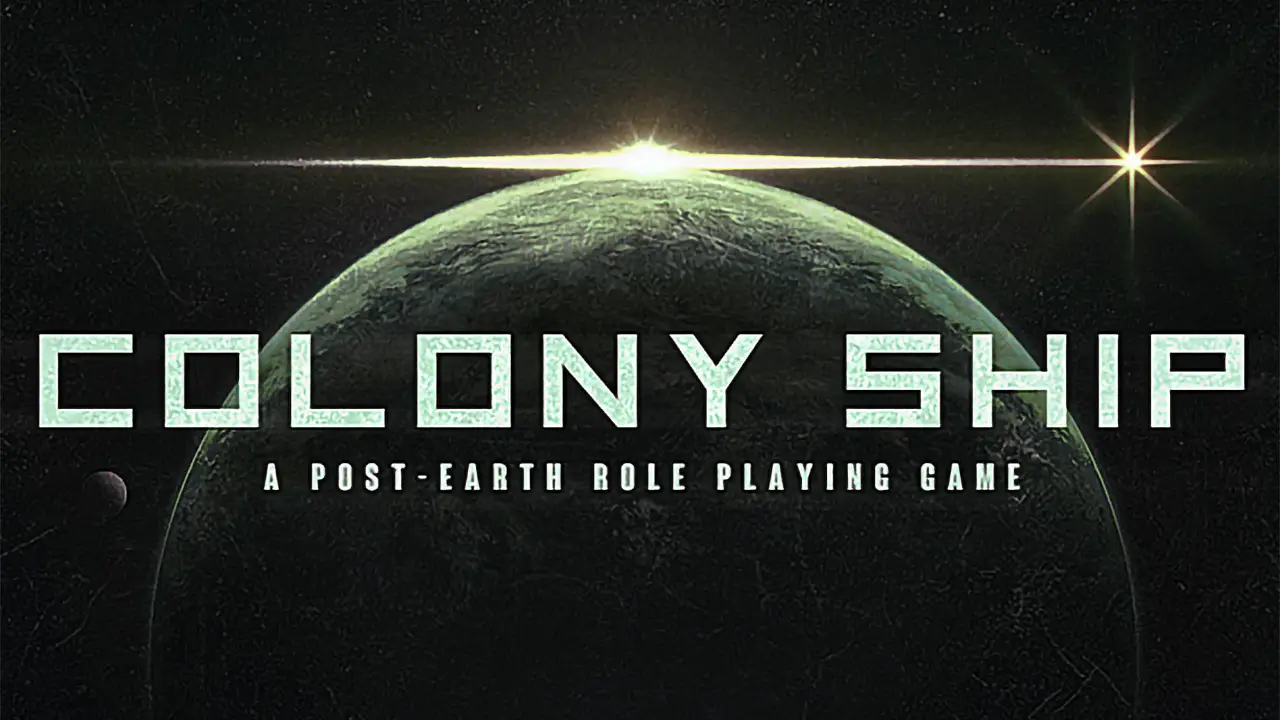RPGs feel hit-or-miss to the extreme in recent years. Most end up being too much of a time commitment without enough of an entertainment payout, though every so often there’s one that’s worthy of the investment. For every Baldur’s Gate 3, there are dozens of Starfields, but even the strong entries into the genre rarely have the true roleplaying feel of the classics.
I want to see more games with true storytelling that stay with you for years after playing them and continue to make their way into gaming discussions like Fallout: New Vegas, Arcanum: Of Steamworks and Magick Obscura, and Dragon Age: Origins.
Fortunately, even though they are a rarity, there are still some new releases that carry the torch admirably. Colony Ship: A Post-Earth Role Playing Game by Iron Tower Studio is the most recent of these that I have had the good fortune of getting my hands on. Though it isn’t flawless, it is an excellent title where the experience itself shows the clear devotion and passion that went into its creation.
Table of contents:
- One Big Ship
- Then You Awaken in Your Apartment
- Tools of the Trade (Both External and Internal)
- When Push Comes To Disruptor Grenade
- A Few Tweaks and Repairs
- The Bottom Line
One Big Ship
Colony Ship takes place on, you guessed it, a colony ship. It’s a colossal vehicle that set out for a new home while Earth was in its final stages of becoming entirely unviable for human life – remember to recycle, kids. It carries on it a vast array of machinery and resources intended to establish a functioning city for the massive population that is housed within it. Generations have lived and died on the ship since its launch, and with each, the colonists remember less of Earth while becoming increasingly pessimistic about their situation.
This resulted in a widespread and violent mutiny that was ultimately unsuccessful but shattered the last remnants of unity among the crew leading to the handful of factions that exist when our character steps into the limelight.
The setting takes on a dystopian feel with a population that is split on whether they are ever going to make it to their intended destination. The ship has begun to fall into disrepair with resources and living space becoming increasingly scarce as greed and self-preservation define those who reside on the ship.

On top of these complications that threaten the existence of what may be the last surviving humans, the three most powerful factions on-board seem to be hurtling headlong into a war that will leave no one untouched.
Then You Awaken in Your Apartment
When your character enters the picture, you’ll find yourself in one of the cargo settlements known as The Pit. It’s something of a grungy no man’s land with little in the way of luxuries and plenty in the way of power struggles between those acting as its leadership.
One of your first big choices involves siding with one of these minor factions and determining who will serve as the boss going forward. Choices like these are what really make Colony Ship stand out from many of the RPGs that serve as its competition as they result in a serious and permanent change to the setting that you’ll feel throughout your story. It’s not rare to run into an unexpected benefit or complication that has come about due to a decision that had been made much earlier.
The specifics of the choices you can make stand out to me as they not only alter the world and the ending of the story but also the gameplay outside of the narrative. It is entirely possible to play a non-combat run by focusing on the several social skills available, a stealth run by building on your sneaking and utility capabilities, or a classic murder spree by solving every problem with good old-fashioned violence.

Of course, you can always meet somewhere in the middle by picking and choosing, based on the scenario at hand, to tell your own story as well. My run was heavily social, though I recruited a handful of violent party members to travel with when I decided the most appropriate answer was rolling up my sleeves and knocking some heads together.
The character advancement system is rewarding and implements the approach where using a skill makes you better at it. Shooting your assault rifle at your enemies will make you a better shot, while hacking a digital system will make you more tech-savvy with each success.
However, gaining a level is not a hands-off process as you can further specialize each character with a variety of feats ranging from notable boosts to the previously mentioned skills, increasing the number of cybernetic implants that you can handle, boosting your initiative, and so on.
I was impressed with the number of feats available and how fluidly they paired with the skill system. Achieving the skill level necessary to lockpick a door or stealth past a security team was also thrilling as some of the more challenging opportunities are encountered earlier rather than later.
Tools of the Trade (Both External and Internal)
While your feats and skills will take you far, you’ll also be relying on your gear to overcome the obstacles that stand in your way. Weapons come in a variety of shapes and sizes with varying attributes of their own, though they tend to be relatively standard for a setting of this sort so there will be few surprises, for better or worse.
They fall into the familiar classifications of bladed, blunt, pistols, shotguns, SMGs, and rifles. Armor slots are set up in a way that is certainly unique from most games out there, but it isn’t the most intuitive system. Your body is separated into a number of slots that can hold equipment ranging from axes to helmets to power cores, though some pieces of armor will take up multiple slots complicating the process of maximizing your efficiency.

When you’re replacing a set of leg armor with another, it’s easy to see how it will impact your overall build at a glance. When another set of leg armor takes not only that slot but two other neighboring ones as well, it ends up involving significantly more effort than that glance to get it all in order.
Implants are another category of equipment that provides a serious leg up over your competition. They tend to give significant advantages and bonuses, usually starting with a flat bonus for one of your attributes. Each of these can be further augmented with upgrades which allow you to even further customize your character builds.
Most of these upgrades are geared toward combat, but there are a few notable options that enable non-combat characters to contribute to the party’s success as well. These are definitely worth getting your hands on if you have the money for them (or if you have enough biotech skills and want to carve them out of the skulls of your enemies instead).
When Push Comes To Disruptor Grenade
Combat is acceptable for the genre and doesn’t get in the way of the other aspects of Colony Ship, though you won’t find anything mind-blowing here. Action points, accuracy, evasion, damage, and damage resistance are the key elements you’ll need to pay attention to, and the better a character is with these as a whole, the better the combatant they will be.
The combat abilities of individual weapons are what will stand out here more so than the basics. For example, you’ll be able to fan the hammer with your revolver like an old-school cowboy, knock enemies down with your sledgehammer, or aim for the legs to slow down a dangerous foe.

Combat is far from easy if you’re not built for it, though, as I quickly learned with my non-combat character, who was carried by his more battle-oriented team in every single encounter. Calling him useless in a firefight may genuinely be giving him too much credit.
A Few Tweaks and Repairs
Though it excels over most of its peers, you will encounter a few flawed elements as your story progresses. You’ll occasionally run into choices that end up being significantly more extreme than the brief conversational statement would have suggested.
I made a habit of saving before I dealt with any character that I felt was going to make a serious impact, as I’d been caught by surprise by this once or twice earlier on. You can feel the way the world changes by the choices you make, so you definitely want those decisions to be the ones you intended.

Speaking of choices, some conversations felt like a puzzle when they really shouldn’t have, where you feel as if you’re navigating to find the correct order of responses and fighting against them instead of having readily available options in front of you based upon your skills. There were also typos and misspellings that I noticed, not enough to tarnish the experience, but could be jarring to players who are sensitive to that when they’re in the zone.
The Bottom Line
Colony Ship: A Post-Earth Role Playing Game is an excellent entry into the genre, especially when compared to the modern releases that surround it. It took me around eighteen hours to complete everything that I wanted to in the experience, and the vast majority of that was enjoyable, if not outright thrilling.
Your choices have an impact in a setting that is entirely capable of making its players lose themselves in it. It’s old-school in many ways, both positive and negative, but this lends itself to its charm and whether you’re passionate about classic cRPGS or simply looking for a new one to play, I highly recommend giving Colony Ship a shot especially with the frequency of updates from Iron Tower Studio.







